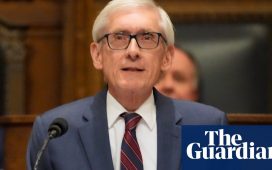‘Finish your cars in America and you win’: commerce secretary says Trump’s auto tariff relief aimed at reshoring production
As we reported earlier, Donald Trump will sign an executive order later today giving automakers building vehicles in the US relief from part of his new 25% vehicle tariffs to allow them time to bring parts supply chains back to the US, commerce secretary Howard Lutnick said.
Lutnick told reporters that automakers would receive credits for up to 15% of the value of vehicles assembled in the US that could be applied against the value of imported parts. This would help domestic carmakers move their supply chains to the US, he said. The relief would be phased in over three years, he added.
All cars that are finished in the US that have 85% domestic content will have no tariff applied, Lutnick said, adding that the auto tariff will apply to foreign carmakers building cars in the US. “This is ‘finish your cars in America and you win’,” he said.
Autos and parts subject to the 25% section 232 steel and aluminum tariffs would no longer be subject to other tariffs imposed by Trump, including 25% duties on Canadian and Mexican goods, as well as 10% duties applied to most other countries, Reuters reports.
Reuters reports that Lutnick said the adjustments to auto tariffs were aimed at allowing domestic carmakers time to grow their US plants and employment. He said it hadn’t been clear until conversations with automakers that even a small tariff would hold them back from hiring and investment. He said they told Trump they needed relief in order to boost hiring plans.
Two years was the agreed time to give manufacturers sufficient time to build up their supply chains, Lutnick said, adding there would be no third year of relief.
Key events
Representative Don Bacon draws $500bn red line on Medicaid cuts in GOP megabill
Key GOP moderate Don Bacon has privately told the White House he won’t accept more than $500bn in cuts to Medicaid, two people with direct knowledge of the matter have told Politico.
Bacon’s red line could complicate matters as Republicans try to pass its massive party-line megabill to enact Trump’s domestic policy agenda, which is set to include border security, energy policy and other provisions.
The representative from Nebraska told Politico he wants to limit the changes to Medicaid to implementing the first-ever federal work requirements for the program, excluding noncitizens from eligibility for benefits and mandating more frequent eligibility checks.
Moderates like Bacon are wary of cutting deep into social safety net programs like Medicaid, while GOP fiscal hawks are pressing for more drastic cuts to federal spending. With the party’s slim majorities in both chambers, House speaker Mike Johnson – despite his optimistic tone this morning – can’t afford to lose more than three Republicans on a party-line vote.
FBI and national security agencies using polygraphs for ‘leak’ hunts – report
Kash Patel has instructed the FBI to administer polygraph tests to identify the sources of alleged leaks to news outlets, the Washington Post (paywall) reports.
In recent weeks the bureau’s director has ordered the tests be used to investigate sensitive information that was shared with the press, creating a climate of fear and intimidation, according to the Post.
The polygraphs are part of an administration-wide effort to clamp down on dissent, sources told the paper.
Current and former officials describe a culture of intimidation where the “sense of dread is palpable” among employees, with one former FBI field office head saying:
People are trying to keep their heads down. Morale is in the toilet.
Trump administration proposed sending up to 500 alleged Venezuelan gang members to El Salvador’s mega-prison
The United States proposed sending up to 500 Venezuelan migrants with alleged ties to the Tren de Aragua gang to El Salvador as the two governments sought to reach an agreement on the use of the nation’s notorious mega-prison, according to emails seen by CNN.
The details of the arrangement, which have not been previously reported, reveal the Trump administration’s deal-making with El Salvador to take the unprecedented step of sending migrants to the country to be detained in Cecot.
El Salvador eventually agreed to accept up to 300 people in mid-March, according to an internal document. A US official described 500 as a “notional” figure, adding that the arrangement between the two countries is a “cooperation agreement but in a friendly non-binding fashion”, and still stands.
Trump called Bezos to complain about report that Amazon planned to list tariff costs on site
Donald Trump called Amazon executive chairman Jeff Bezos on Tuesday morning to complain about a report the company planned to display prices that show the impact of tariffs, according to multiple media outlets.
Amazon denied the story and said it never considering listing tariff prices on its main retail site nor had anything been put into place.

Andrew Roth
‘The weeks when decades happened’: Trump’s first 100 days took the US from cornerstone of the west to unreliable ally
For US foreign policy, Donald Trump’s first 100 days in office were the weeks when decades happened.
In just over three months, the US president has frayed alliances that stood since the second world war and alienated the US’s closest friends, cut off aid to Ukrainians on the frontlines against Vladimir Putin, emboldened US rivals around the world, brokered and then lost a crucial ceasefire in Gaza, launched strikes on the Houthis in Yemen and seesawed on key foreign policy and economic questions to the point where the US has been termed the “unpredictable ally”.
The tariffs Trump has unleashed will, if effected, disrupt global trade and lead to supply chain shocks in the United States, with China’s Xi Jinping seeking to recruit US trade allies in the region.
Operating mainly through executive action, the Trump administration has affected nearly all facets of US foreign policy: from military might to soft power, from trade to immigration, reimagining the US’s place in the world according to an isolationist America First program.
“The shake-up has been revolutionary, extraordinary. It’s upended 80-some years of American foreign policy,” said Ivo Daalder, president of the Chicago Council on Global Affairs and a former ambassador to Nato.
The Trump presidency has ended the relative peace in the western hemisphere since the end of the second world war underwritten by US economic, military and diplomatic influence, Daalder said.
The foundation of the Pax Americana was trust, and once you break trust, it’s extraordinarily difficult to restore. And restoring trust – trust in America, trust in American institutions, trust in American voters – it takes a long time to rebuild.
‘Finish your cars in America and you win’: commerce secretary says Trump’s auto tariff relief aimed at reshoring production
As we reported earlier, Donald Trump will sign an executive order later today giving automakers building vehicles in the US relief from part of his new 25% vehicle tariffs to allow them time to bring parts supply chains back to the US, commerce secretary Howard Lutnick said.
Lutnick told reporters that automakers would receive credits for up to 15% of the value of vehicles assembled in the US that could be applied against the value of imported parts. This would help domestic carmakers move their supply chains to the US, he said. The relief would be phased in over three years, he added.
All cars that are finished in the US that have 85% domestic content will have no tariff applied, Lutnick said, adding that the auto tariff will apply to foreign carmakers building cars in the US. “This is ‘finish your cars in America and you win’,” he said.
Autos and parts subject to the 25% section 232 steel and aluminum tariffs would no longer be subject to other tariffs imposed by Trump, including 25% duties on Canadian and Mexican goods, as well as 10% duties applied to most other countries, Reuters reports.
Reuters reports that Lutnick said the adjustments to auto tariffs were aimed at allowing domestic carmakers time to grow their US plants and employment. He said it hadn’t been clear until conversations with automakers that even a small tariff would hold them back from hiring and investment. He said they told Trump they needed relief in order to boost hiring plans.
Two years was the agreed time to give manufacturers sufficient time to build up their supply chains, Lutnick said, adding there would be no third year of relief.
Senate backs Trump’s pick former senator and business executive David Perdue for ambassador to China
A majority of the Senate has backed one-time senator David Perdue to be ambassador to China, a position the former business executive assumes amid a deep strategic rivalry and blistering trade war between the two countries.
Reuters reports the tally was 67 to 29 in favor of confirming Donald Trump’s nominee Perdue, who was a Republican senator from Georgia from 2015 to 2021.
Perdue has long been an ally of Trump and has fiercely repeated the president’s lies about voter fraud in the 2020 election. He ran unsuccessfully to be governor of Georgia in 2022 after losing his Senate seat, making voter fraud central to his campaign and falsely claiming that his seat had also been “stolen”. He’s also the former chief executive of Dollar General.
The National Academy of Sciences has canceled a planned workshop on preventing human bird flu infections following instruction from the US Centers for Disease Control and Prevention (CDC) to stop work on the event, according to Reuters.
There have been 70 reported cases of bird flu in the US in the past year, with the virus spreading aggressively among cattle herds and poultry flocks. Most of the reported cases were among farmworkers.
Ongoing federal worker terminations at US health agencies have impacted staff working on the bird flu response, according to Reuters. The FDA this month also suspended existing and developing programs that ensured accurate testing for bird flu in milk and cheese products.
While the president, along with Republican leaders, are celebrating the accomplishments of the Trump administration’s first 100 days, many Democrats paint a different picture of what the president’s first few months have looked like.
House Minority Leader Hakeem Jeffries wrote in a social media post today:
“The Trump administration has been an unmitigated disaster over the first 100 days.
“These extremists are not fit to govern and we will hold them accountable.”
Amazon denies report that it planned to list tariff costs on site
Amazon has denied a report today that it planned to disclose the cost of US tariffs imposed by president Donald Trump to its products, after the White House widely denounced the move.
The company said it never considered listing tariffs on its main retail site and nothing was implemented on any company site. “The team that runs our ultra low cost Amazon Haul store has considered the idea of listing import charges on certain products,” a company spokesperson told Reuters.
White House press secretary Karoline Leavitt said earlier she had discussed the initial news with Trump and his response was: “This is a hostile and political act by Amazon.”
The comments caused Amazon shares to dip 2.2% in premarket trading, according to Reuters.
Asked about recent polls indicating Donald Trump’s dire approval ratings at the GOP leadership press conference this morning, House speaker Mike Johnson seemed to acknowledge the second Trump administration’s “rocky start” as it marks 100 days in office.
He said:
In any new administration, it’s a rollercoaster. When you come in and you make dramatic change, which is what he did – he’s delivering on the promises made – there’s some bumps along the road. I mean, we’re changing everything.
It’s game time for the budget reconciliation, the scramble for which continues in the House today with three more markup sessions getting started. But, however, optimistic the tone struck by treasury secretary Scott Bessent this morning or speaker Mike Johnson yesterday evening, the GOP still hasn’t figured out where the dramatic spending cuts are going to come from. The party has promised to eradicate trillions of dollars from the deficit, and is privately debating controversial changes to Medicaid or social safety net programs relied on by tens of millions of Americans in order to do it – something that at least a dozen Republican lawmakers have publicly said they will not support.

Graeme Wearden
My colleague Graeme Wearden notes that shares in Amazon have dropped 1.3% at the start of trading, after the White House accused it of a “hostile” act for showing consumers the cost of tariffs.
The White House’s attack on Amazon is a “significant” move which could alarm the financial markets, says Kathleen Brooks, research director at trading platform XTB.
She writes that it’s a sign that the US administration is targeting companies who disagree with them – that means an increase in political risk.
Brooks explains:
The US administration has changed its tone towards tariffs yet again on Tuesday. The White House Press secretary and the Treasury Secretary accused Amazon of a ‘hostile political act’, after Amazon planned to expose the cost of tariffs to its consumers. This comes days before Amazon reports earnings on Thursday, and its stock price fell ahead of the US open and is down more than 2% so far.
The US administration has mostly saved its ire for other countries that it believes gives the US a raw deal in global trade. Now it appears that the US administration is targeting US companies who question the logic of its moves. This is significant. Financial markets have been roiled by political interference in the global economy in recent weeks. Investors do not digest political risks well, so if the Trump administration is now publicly accusing US companies of hostile acts if they disagree with the President’s US economic policy then this could stop the recent recovery rally in risky assets.
Political analyst Ian Bremmer has also questioned the White House’s argument, suggesting that telling a customer the cost of tariffs on their goods is no different than flagging the sales tax on a receipt.
You can follow all of Graeme’s reporting on our business live blog:
Key takeaways from White House press briefing with US treasury secretary Scott Bessent
-
Donald Trump will sign an executive order on auto tariffs today as he tries to cushion the impact of his tariffs on US carmakers.
-
The Trump administration wants to provide companies looking to relocate to the US full expensing of factories and equipment purchases and make it retroactive to 20 January, treasury secretary Scott Bessent said.
-
Bessent repeated his assertion that “tariffs are unsustainable for China” and claimed that China could lose up to 10m jobs if the high tariffs remain in place. He said “the onus will be on them” to remove tariffs, despite Trump starting the tariff war, and also would not say whether the US and China were talking directly to negotiate a deal.
-
Bessent added that he does not anticipate supply chain shocks from Trump’s sweeping tariffs.
-
Amazon’s announcement that it will include the price of tariffs on the price-tag for products is “a hostile and political act”, according to Trump.
-
Bessent said tariff revenue has the potential to provide income tax relief, repeating an assertion from Trump yesterday that some people’s income taxes could be lowered or even completely eliminated due to tariffs.
-
An announcement could be coming soon on a trade deal with India, Bessent said, adding that he “can see the contours of a deal” with South Korea, and that the US has had “substantial talks” with Japan.
-
The United States would like to see the internet tax in the European Union removed, Bessent said.
-
Bessent also claimed discussions with House speaker Mike Johnson over plans to extend Trump’s tax cuts are going well and the bill is moving forward better than expected.
Trump’s choice of location for his 100-day rally tonight is notable for, as Politico highlights, Michigan is a state he won, lost, then won again (in the last two decades the state has backed the presidential winner, and Macomb County as the de facto national capital of white middle America.
Per Politco:
Forty years ago, legendary pollster Stanley Greenberg pinpointed Macomb County as the epicenter of a phenomenon reshaping American politics: Working-class, socially conservative white voters who had traditionally voted Democratic felt betrayed by the party, which had given up on people like ‘us’ in favor of people like ‘them,’ and were eager to support a Republican presidential candidate who promised to make America great again. (Sound familiar?) He called them the ‘Reagan Democrats.’
Ever since, American politics has largely been shaped by a hunt for these voters — both nationally, and specifically in Macomb County, which national politicos have long treated as something like the de facto national capital of white middle America. Tonight, Trump will rally supporters at Macomb community college — the same venue where President Ronald Reagan famously declared: ‘I’m a former Democrat, and I have to say: I didn’t leave my party; my party left me.’ And he’ll do so knowing that the ‘Reagan Democrats’ of yesteryear are now firmly Trump Republicans; places like Macomb aren’t tossups in the way they once were.
The Trump administration wants to provide companies looking to relocate to the US full expensing of factories and equipment purchases and make it retroactive to 20 January, Scott Bessent says
The United States would like to see the internet tax in the European Union removed, Scott Bessent says.











